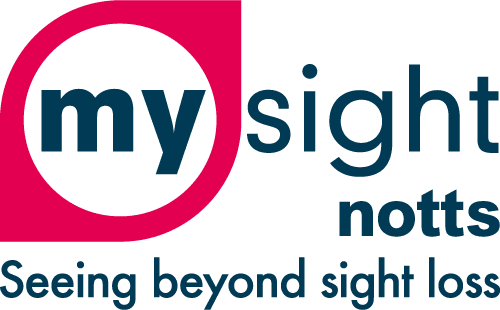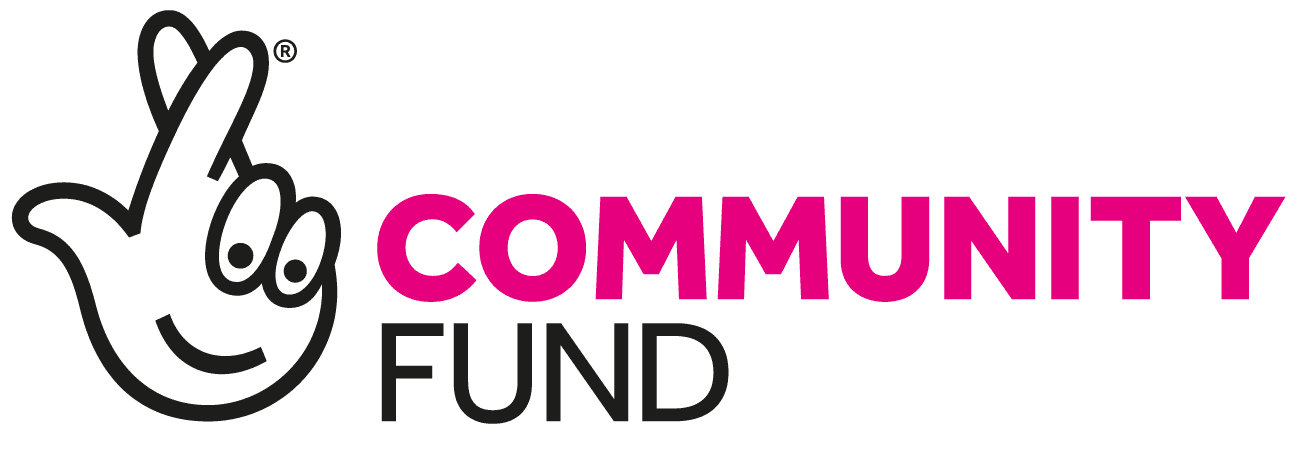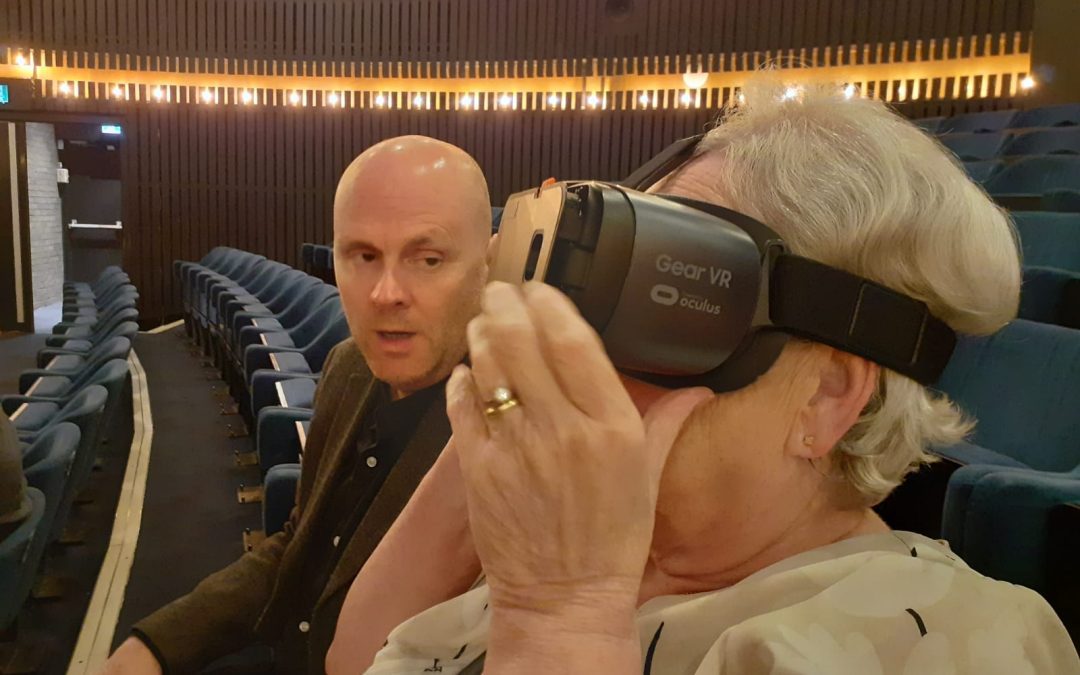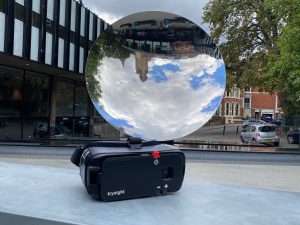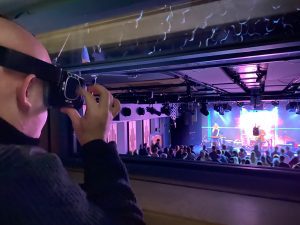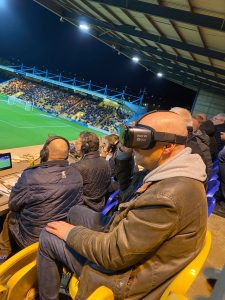Photo shows Matt and Joan at the theatre. Joan is wearing a headset which she cups with her left hand as she focuses on the stage in front of her.
Due to the severity of their sight loss, many people with a visual impairment may feel that there is little to be gained by going to the theatre, visiting an art gallery or attending a football match or concert. Furthermore, for those whose sight has deteriorated, attending such events may serve as a reminder of what is now very difficult or no longer possible, with the lessened enjoyment highlighting the negative impact of their sight loss.
I speak from personal experience and can easily recall football matches I have been to where I did not see my team score (itself a relatively rare occurrence when you follow the team that I do) whilst those around me celebrated in the stands, or gigs where, although enjoying the music as much as everyone else, I missed the accompanying visual performance and effects.
I have Stargardt’s, a condition that means I am registered blind. I have no central vision, rendering me totally reliant on recognising blurred objects in my periphery: not ideal for trips to the cinema, art gallery, football or local gig venue. Sadly these locations were where I could usually be found when my sight was perfect so to lose the enjoyment of visiting these places has been quite a difficult thing to deal with.
Thankfully technological developments and manufacturers concentrating considerably on producing wearable gadgets has seen a sudden surge in the production of headsets and smart glasses. These are head-worn gadgets that allow the wearer to zoom in and out on their surroundings, in many cases changing contrast and colours and enabling printed text to be read aloud to the user too. I was fortunate enough to obtain a headset, a Mercury Viewpoint, and was inspired to start a little research project at My Sight Notts that we have named The Bigger Picture.
Photo shows a headset placed on the floor and reflected in the Mirror Lens outside the Playhouse theatre in Nottingham. You can see the headset reflected in the mirror lens along with the sky, buildings to the left and right and some cars.
The aims of the project are:
- to introduce people with visual impairments to the technology
- to alert venues to the benefits of making such technology available to its audiences, especially those who may currently feel disenfranchised
Our initial thoughts of a successful project were one where venues had their own headsets that could be loaned free of charge to those who would benefit from using them. In the short term though, we would be happy supporting our members in accessing arts and culture and them gaining an increased sense of enjoyment and fulfilment from doing so.
To date we have trialled the headset at a music venue, a theatre and in a football stadium, all with tremendous success and all with amazing spin-offs which have further enriched the experiences of those involved in the project.
Metronome:
Our first test was at Nottingham’s Metronome, a relatively new music and comedy venue in the city centre. The Metronome team were very quick to embrace our concept, especially given that they too have aims to make gigs as accessible and inclusive as possible. Following meetings and visits to the venue we took one of our members, Josh, who has glaucoma, to Metronome’s BBC Introducing concert: a showcase gig for up-and-coming bands and artists from across the East Midlands. On testing the equipment in the PACKED main room we realised that a slightly higher vantage point would be beneficial and so Metronome gave us access to their mezzanine area. This comprises seats and pivoting windows with a view of the stage. This proved ideal for our needs and Josh and I spent the evening taking turns to use the headset to watch the bands.
Photo shows Josh at the theatre wearing a metronome headset which he cups with his right hand as he focuses on the stage in front of him where a woman is playing keyboards and a man is playing a guitar. You can see rows of people in front of them.
Josh remarked on how, despite being at the back of the room, he was able to see the guitarists move their fingers as they played and also the visual effects on the screen behind the bands. We were both able to see the facial features of the artists – (something neither of us would have otherwise been able to do. We could also discern other gig-goers rather than them just being one dark mass of people; it was quite a moment.
Nottingham Playhouse
Following a meeting with Playhouse staff we were invited to bring one of our members, Joan, to a performance of Shakespeare’s Much Ado About Nothing. Joan has macular degeneration and, therefore has no central vision and extremely limited remaining sight. Amazingly Joan kept the headset on for the entire performance (no mean feat given the length of the play) and at the end said, “I wouldn’t have missed this experience for the world.” Joan went on to explain that she was able to see characters and props at the very back of the stage; she was also able to follow the play and identify which actor was talking – all things she would not have been able to do without the technology, and more than I was able to do with a less-severe visual impairment and a telescope!
Mansfield Town F.C.
Our most recent trial was up at the One Call Stadium watching Mansfield Town take on Newport County in an EFL League Two evening fixture. Josh and I are both huge football fans who normally rely on monoculars (small telescopes) to watch games; it is not ideal but it’s been our best option to date. We often miss subtle moments in play and find tracking the ball almost impossible.
Ahead of the game I had concerns about using the headset in the glare of the floodlights, and also following people moving at a faster pace than actors and musicians. I need not have worried though as the headset gave both of us remarkable clarity and allowed us to see detail neither of us had seen in years. The club was extremely accommodating, giving us seats in the main stand on the halfway line. We were much higher than the pitch and it was the perfect location. Sadly Mansfield Town didn’t manage to score (the match finished 0-0) but it demonstrated once again that those of us with significant sight loss can still gain enjoyment from things we thought were now inaccessible.
Photo shows Matt wearing a headset and looking towards a football pitch. In front of him are three other men wearing headphones and mics (they are the audio description team).
The reaction of the people around us was refreshing and positive: we were asked about the technology and why we were using it, some fully-sighted fans even tried on the headset and remarked on how good it was for us. Everyone just appreciated the fact that we could still go to a match and gain as much from it as they could.
Further Enrichment
The project has also led to other positive experiences that we had not necessarily expected when first setting out. At Metronome we learnt about their accessible mezzanine area and also that people with various disabilities can apply for a free essential companion ticket. This means that, if a customer needs someone else to help them safely navigate the venue, they can apply for one person to come with them free of charge.
At the Playhouse we were invited to take part in a touch tour of the stage ahead of the performance. Not only were we able to see the set and props close up, but the tour was conducted by members of the cast, in full costume, who talked about their characters and how they would move on and off the stage. This greatly enhanced our understanding of the performance and allowed us to appreciate the actors’ costumes and the stage set.
During our early discussions around the football we encountered Alan March Sports Ltd: a company which, amongst other things, provides bespoke audio commentary at football matches. This meant that we also had a running audio commentary delivered in a way that ensured we always knew what was happening and where the ball was.
The Future
We still intend to work with those mentioned above as well as branching out yet further. We have been meeting with Nottingham Forest’s Disabled Supporters’ Association about getting the headset down to the City Ground. We continue to contact other clubs across the county and are also looking at art galleries and other attractions. We would also like to showcase the technology to a wider audience and are happy to do so by appointment.
It is fair to say that we have had a tremendous start to The Bigger Picture; come back soon to see how we are getting on.
For further information on The Bigger Picture please contact Matt Harrison, Services Supervisor at My Sight Notts.
